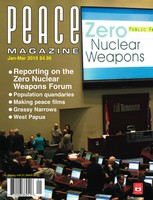
Peace Magazine Jan-Mar 2010, page 25. Some rights reserved.
Search for other articles by Yeshua Moser-Puangsuwan here
In the mid-1990s, the Canadian government joined with an international civil society movement to create the 1997 Mine Ban Treaty, also known as the Ottawa Treaty. The movement to ban landmines was mobilized by outrage over the casualties caused by antipersonnel mines, scattered by soldiers, in wars around the world. The global mine ban has been a success [see The Mine Ban at 10, Peace Magazine, January-March 2007].
Canada is obligated under international humanitarian law to protect civilians during conflict. Like other countries, general rules are not enough to protect civilians from certain weapons that cannot discriminate between civilians and military targets, or that cause excessive humanitarian harm. This is why Canada should join other states in banning Cluster Weapons [see ‘Banning Cluster Bombs: Light in the Darkness of Conflicts,’ Peace Magazine, July-September 2008].
The Convention on Cluster Munitions was signed by 94 countries, including Canada, in Oslo, Norway in December 2008. However, the Cluster Convention has not yet become legally binding internationally because 30 states have yet to ratify it. Canada has not ratified its signature to the treaty. Nor is it advocating energetically, as it did for the Ottawa (Mine Ban) Convention, for other states to ratify quickly.
There is no reason why Canada cannot ratify swiftly. Canada has not used cluster munitions anywhere, nor does it produce the weapon (although a Canadian company produced a component of a cluster weapon). Canada has purchased two types of cluster weapons from the United States. The stockpile of one of these weapons was destroyed in 2007 because of its age, the other cluster weapon has reportedly been withdrawn from the Canadian arsenal and has been scheduled for destruction.
The Cluster Convention prohibits any assistance of any activity which would violate the prohibitions of the convention. Mines Action Canada’s believes this certainly includes investments by Canadians in companies which manufacture the weapon, since this enables their production. Currently the Canada Pension Plan Investment Board, Canadian Imperial Bank of Commerce, Caisse de Depot et Placement du Qu?bec, CI Financial Corporation, and Scotiabank are known to own shares or bonds in companies which produce cluster weapons, and their customers are encouraged to contact these institutions and request divestment.
The Cluster Munition Coalition (CMC) is a global network of around 300 civil society organizations working in more than 80 countries to end the harm caused by cluster bombs. The CMC was launched in November 2003 and Mines Action Canada, the Canadian branch of the International Campaign to Ban Landmines, was a founding member of the CMC.
Yeshua Moser-Puangsuwan is engaged in research and advocacy for Mines Action Canada, a coalition of 36 Canadian non-governmental organizations working to eliminate the serious humanitarian, environmental and development consequences of landmines and other explosive remnants of war.
Resources**
www.minesactioncanada.org/
www.stopclustermunitions.org/
www.clusterprocess.org/

Peace Magazine Jan-Mar 2010, page 25. Some rights reserved.
Search for other articles by Yeshua Moser-Puangsuwan here